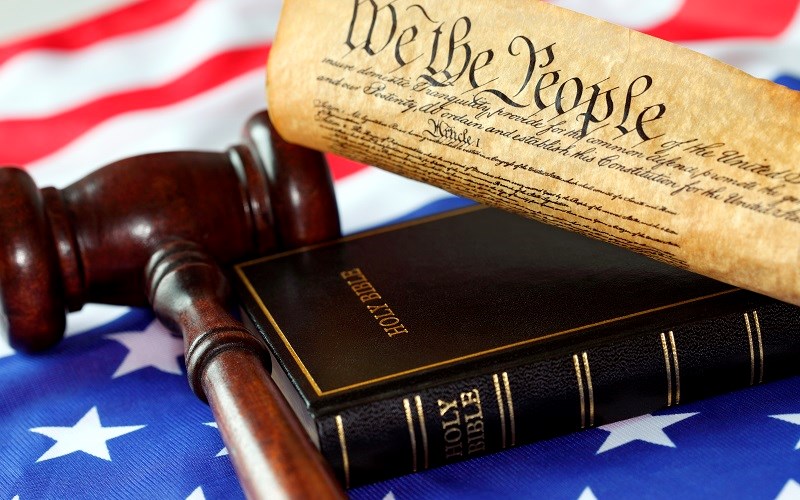The Court announced Thursday it would send the Biden administration’s challenge to the law back to the Ninth Circuit Court of appeals.
The Court’s decision is particularly interesting in light of its 2022 ruling to overturn Roe v. Wade and return control of abortion matters to the states.
The Idaho law, as written, protects life from conception, the only exception being danger to the mother.
“Everybody understood that’s what it meant, and after Dobbs (Roe v. Wade decision) it was supposed to go fully into effect,” John Bursch, senior counsel for Alliance Defending Freedom, said on Washington Watch Thursday.

In response to the Dobbs’ decision, the Biden administration has turned to a federal law, The Emergency Medical Treatment and Active Labor Act (EMTALA), in an effort enforce its abortion preferences.
EMTALA requires hospitals that receive Medicaid to treat all patients who show up at emergency rooms.
“The administration took that and turned it into an abortion mandate. Then they sued the state of Idaho to try to guarantee that emergency rooms could be abortion enclaves, even in a pro-life state like Idaho. That’s the case that came to the Supreme Court,” Bursch said.
The Court’s inaction wasn’t a clear victory for Idaho, but there’s cautious optimism from pro-life advocates while the Ninth Circuit, historically considered a left-leaning activist court, deliberates further.
That hope comes from dissenting comments from liberal Supreme Court justice Ketanji Brown-Jackson – who in her confirmation hearings in the spring of 2022 refused to define “woman”.
The Court’s decision “is not a victory for pregnant patients,” Brown-Jackson wrote. “It’s a delay. While this court dawdles and the country waits, pregnant people experiencing emergency medical conditions remain in a precarious position, as their doctors are kept in the dark about what the law requires."
Brown-Jackson said the Court had a chance to “bring clarity and certainty to this tragic situation, and we have squandered it.”
Wobbly case for the Feds
Bursch believes Brown-Jackson’s comments indicate that the Biden administration is on thin ice with its case.
“I think that’s right,” he said.
Dissent written by justices Clarence Thomas and Neil Gorsuch showed strong support for Idaho’s case and said the Court could rule in the state’s favor “right now just based on the simple statutory text.”
However, “the majority of the justices didn’t think that was appropriate and want to give this a little bit more process.”
Bursch, though, is upbeat as he reads the tea leaves should the Idaho case or a similar bubbling in the Fifth Circuit make it back to the Supremes.
In the Fifth Circuit, the administration is challenging a lower-court ruling that the EMTALA rule was an invalid interpretation of the federal Medicaid Act.
In the Idaho case, the administration argued that the Constitution’s supremacy clause, which establishes the “supremacy” of federal law over state law, gave them legal standing to squash the pro-life state’s law.
“That was their position, but there were a couple of problems with that. The supremacy clause only kicks in if there is a conflict between federal law and state law, and here there was no conflict because federal law and state law are both aiming to preserve life, not take it,” Bursch said.
Abortion is never mentioned in EMTALA, Bursch said.
“It treats the unborn child," he explained, "as an additional patient that emergency room doctors have to care for. Idaho’s position all along has been that there’s no conflict, so there’s no (need for) the supremacy clause.”
With such clarity, why didn’t the Supremes just rule on the case?
Broad dispute becomes narrow
Bursch said the majority opinion, written by Donald Trump appointee Amy Coney-Barrett, said the case changed when the administration admitted that emergency room abortions were not required in most cases.
Essentially, Idaho’s case remains almost entirely intact, the Court reasoned. Therefore, the injunction issued by the lower court was unnecessary. It would not stop Idaho from enforcing its law in most circumstances.
Suddenly the dispute went from very broad about emergency rooms as abortion enclaves to very narrow, Bursch said.
“Those justices thought this needed some further deliberation by the Ninth Circuit before they made a final decision. So, we'll take those concessions. They're absolutely terrific for protecting life, not only in Idaho but in pro-life states around the country. We’ll keep litigating back in the ninth circuit, and if we have to come back to the supreme court, we'll do that,” Bursch said.







